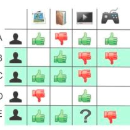Many of the traditional recommendation algorithms are designed based on the fundamental idea of mining or learning correlative patterns from data to estimate the user-item correlative preference. However, pure correlative learning may lead to Simpson's paradox in predictions, and thus results in sacrificed recommendation performance. Simpson's paradox is a well-known statistical phenomenon, which causes confusions in statistical conclusions and ignoring the paradox may result in inaccurate decisions. Fortunately, causal and counterfactual modeling can help us to think outside of the observational data for user modeling and personalization so as to tackle such issues. In this paper, we propose Causal Collaborative Filtering (CCF) -- a general framework for modeling causality in collaborative filtering and recommendation. We provide a unified causal view of CF and mathematically show that many of the traditional CF algorithms are actually special cases of CCF under simplified causal graphs. We then propose a conditional intervention approach for $do$-operations so that we can estimate the user-item causal preference based on the observational data. Finally, we further propose a general counterfactual constrained learning framework for estimating the user-item preferences. Experiments are conducted on two types of real-world datasets -- traditional and randomized trial data -- and results show that our framework can improve the recommendation performance and reduce the Simpson's paradox problem of many CF algorithms.
翻译:暂无翻译




